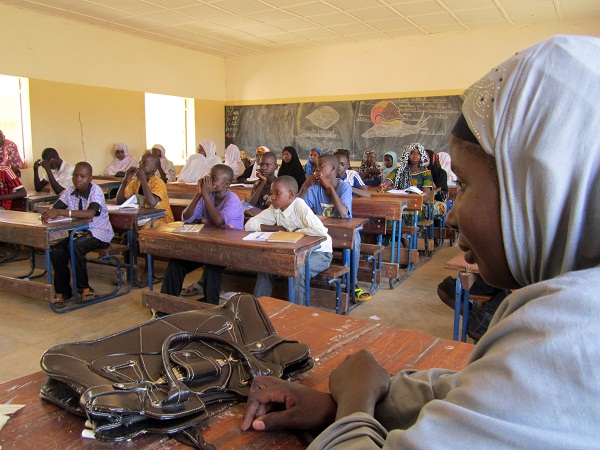UN official: Islamists in Mali are targeting women

In this Thursday, September 27, 2012 photo, school children listen to a teacher during class in Douentza, Mali. Radical Islamists who control northern Mali are reopening some schools, though girls now must wear veils and are being seated separately in the back or coming at a different time altogether. The separation of boys and girls in the classroom is the latest example of how the Islamists are implementing their strict interpretation of Islam in the vast north where al-Qaeda-linked militants roam.AP/Baba Ahmed
UNITED NATIONS — A senior U.N. official who just returned from Mali says radical Islamists who now control about two-thirds of the country are targeting women — demanding that they cover their heads, restricting their ability to work, and compiling a list of women who are pregnant or have children but are not married which has raised fears of punishment.
Ivan Simonovic, the assistant secretary-general for human rights, said the Islamists have imposed an extremist form of Islamic law known as Shariah in northern Mali with drastic punishments including the stoning death of a couple accused of adultery, eight amputations, three public executions and a number of floggings.
While the Islamists have banned everyone from smoking and listening to music, he said they have particularly targeted women.
Simonovic cited the case of a woman merchant who fled the north because she couldn’t work and had no family to support her and said it is especially frightening that the Islamists are compiling lists of mothers and pregnant women without husbands.
“When I talked to people from the north, they were afraid of those lists that are being compiled,” he said. “We do not know what will happen with those lists, but certainly women were scared that there might be some action taken against them.”
Simonovic said the number of forced marriages in the north is also increasing.
“The price to buy a wife is less than $1,000,” he said, “and it’s often misused.”
Once forced to marry, women are quite often married to other men by their so-called husbands after a very short time, Simonovic said, “which is a smoke screen for enforced prostitutions and rapes that are taking place.”
Mali’s democratically elected leader was ousted in a military coup in March. The junta accused him of failing to quell a rebellion in the north, which began in January. After the coup, Tuareg rebels took advantage of the power vacuum and within weeks took control of the north, aided by an Islamist faction. But the Islamists quickly ousted the Tuaregs and took control of the north, an area larger than France.
During his four day visit to Mali, Simonovic met leaders of the transitional government in the south, human rights activists and people who had fled the north. He also visited Mopti on the border of the rebel-controlled area where some 40,000 northerners who fled their homes have sought refuge.
Simonovic said that after the Tuareg rebels took over the north there were summary executions of captured soldiers and instances of looting and rape.
“What is new now is that human rights violations are becoming more systematic,” he said, explaining that this is related to the takeover of the north by radical Islamists and groups linked to al-Qaida.
In the south, Simonovic said, society is divided following the coup and a failed counter-coup by special forces loyal to the president.
He said about 30 people are in prison and there is reliable evidence that 20 people are still missing, “and there are indications that they might have been summarily executed.”
The West African regional group ECOWAS and Mali’s transitional government have asked the U.N. Security Council to authorize a military intervention force to help the Malian army oust the Islamists from the north. The council said it wants a workable plan with detailed options before it gives a green light.
Simonovic said it’s extremely important that grave human rights violations related to the coup and attempted counter-coup are investigated and the perpetrators brought to justice because “the United Nations cannot support security forces that are gravely violating human rights.”














